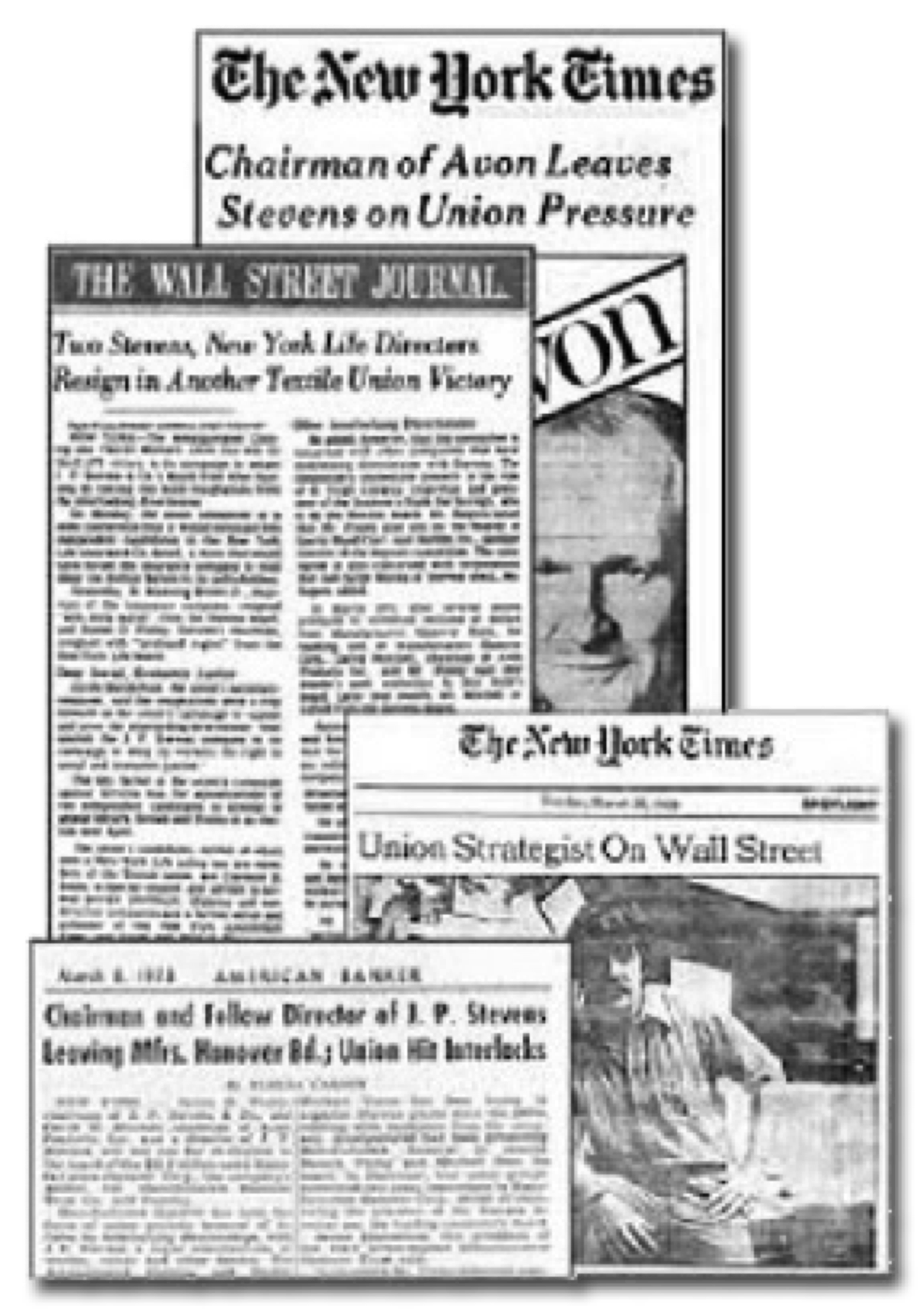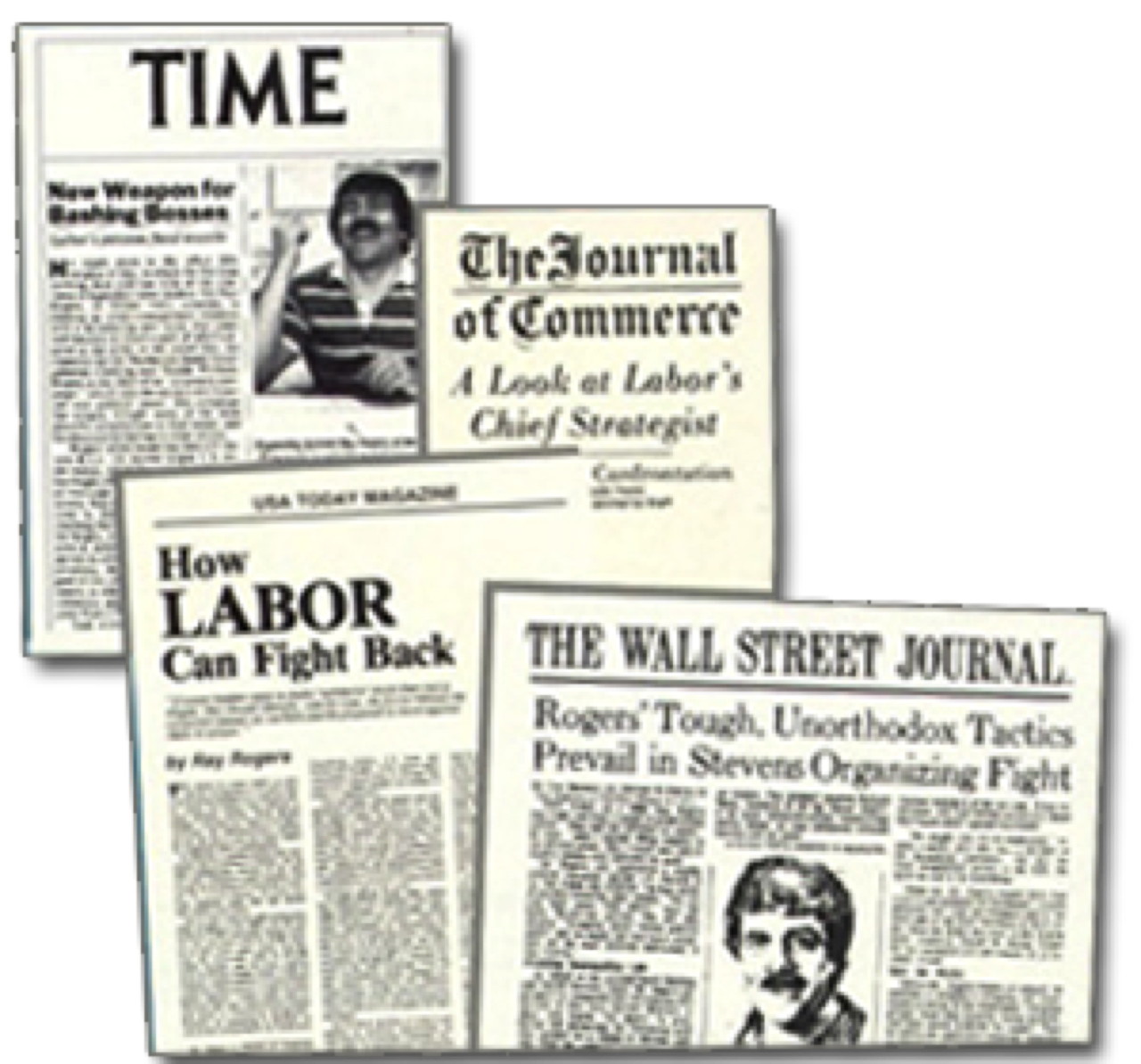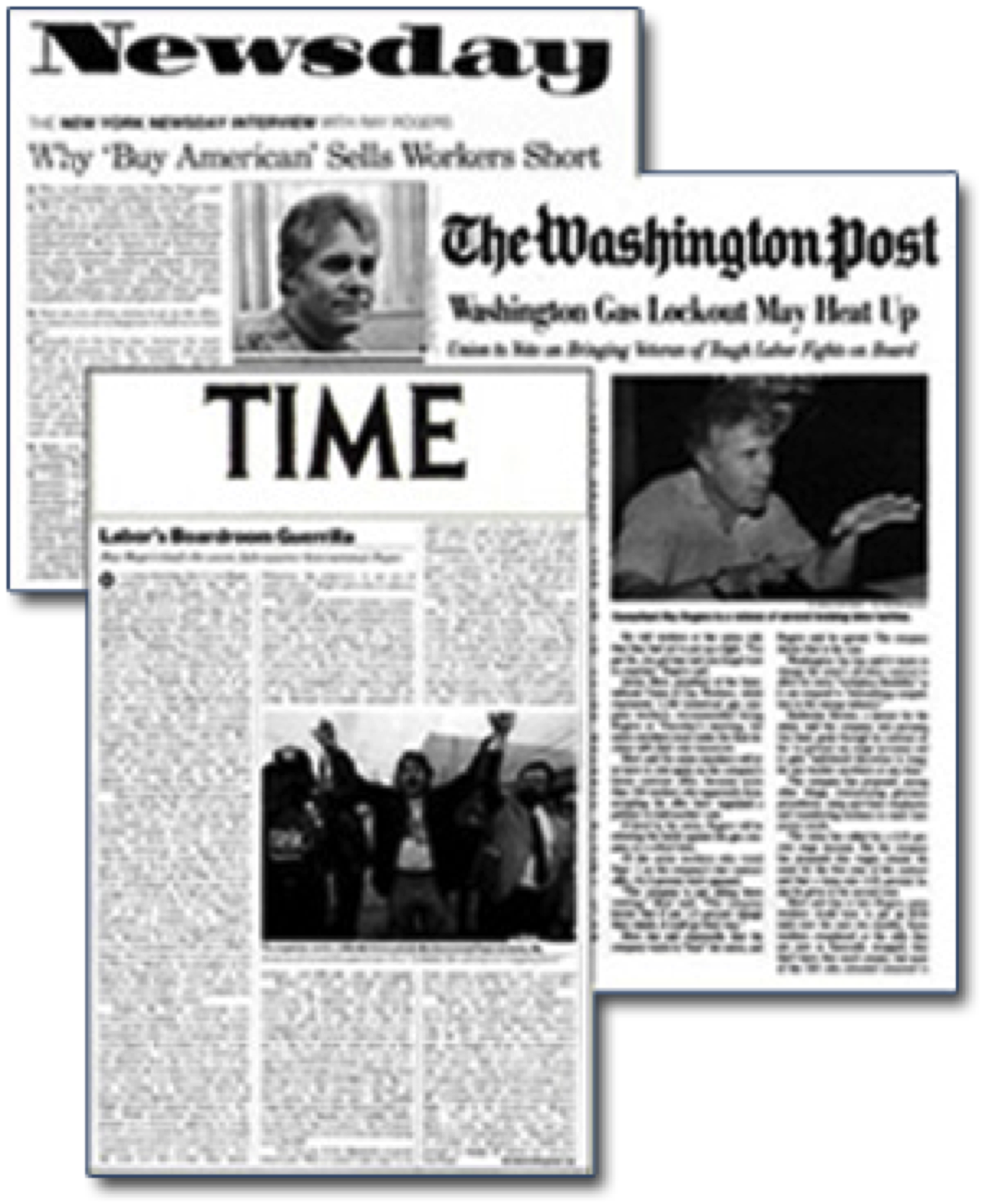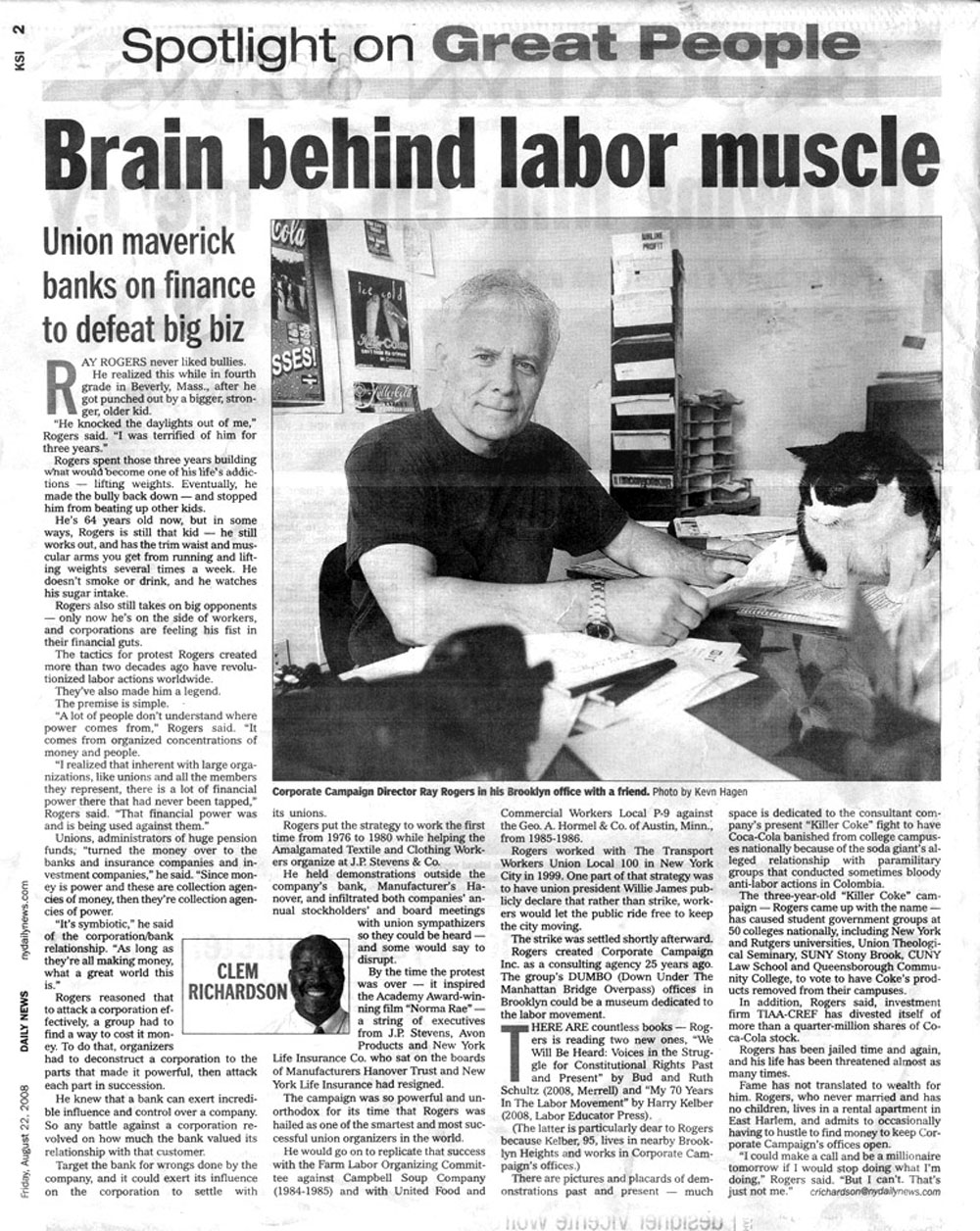The "Corporate Campaign" Strategy
Helping Labor Unions and Public Interest Groups Confront Unbridled Corporate and Political Greed since 1981
Learn More
Helping Labor Unions and Public Interest Groups Confront Unbridled Corporate and Political Greed since 1981

Ray Rogers, director, and Ed Allen of Lancaster, Pennsylvania, co-founded New York City based Corporate Campaign Inc. (CCI) which has championed labor, human rights and environmental causes since 1981. He was born in Beverly, Mass., the son of a union machinist and an electronics assembler. He graduated from the University of Massachusetts in 1967 and spent two years working in Tennessee as a VISTA volunteer. His work on behalf of impoverished people in Appalachia was cited and commended by the Tennessee legislature and featured on NBC Nightly News. Later, he worked with reformers in the United Mine Workers Union to oust its corrupt leaders who were later convicted of the murder of union presidential candidate Jock Yablonski, his wife and daughter.

From 1976 to 1980, while on the staff of the Amalgamated Clothing and Textile Workers, he devised and led its pioneering corporate campaign against the notoriously anti-union J.P. Stevens & Co. on which the Academy Award winning film "Norma Rae" was based. He defined the corporate campaign as a "mechanism to confront power with power." The campaign led to the resignations of the chief executive officers of J.P. Stevens, Avon Products and New York Life Insurance Co. from the boards of Manufacturers Hanover Trust, New York Life and J.P. Stevens. The Wall Street Journal headline (10/21/80) read, "Rogers' Unorthodox Tactics Prevail in Stevens Organizing Fight." Two years earlier, he organized a unique boycott in Alabama that led to the historic Amalgamated Clothing Workers of America victory for 3,000 Chicanos against Texas-based Farah Manufacturing Co. The Boston Herald described Rogers as labor's most innovative strategist and "one of the most successful union organizers since the CIO sit-down strikes of the 1930s."
In the 1980s, Rogers developed campaigns that led to high profile victories for airline, paper and utility workers. He also developed a successful corporate campaign strategy against Campbell Soup Co. for the Farm Labor Organizing Committee, seeking to represent thousands of migrant farm workers. The strategy was instrumental in ending a six-year strike and boycott and winning the union its first contract. In that same period, Rogers became one of the most controversial figures in the labor movement when he developed a campaign against Geo. A. Hormel & Co. for UFCW Local P-9 in Austin, Minnesota. During the campaign he was jailed under a criminal syndicalism statute that was later declared unconstitutional. Corporate Campaign has donated its services to develop strategy for FLOC, which is challenging R.J. Reynolds and the tobacco industry over their abuse of thousands of migrant farmworkers from Mexico. In June 2010, FLOC's corporate campaign led to the forced resignation of Betsy Atkins from the board of Reynolds American/RJ Reynolds. In 2011, under increased pressure form the campaign, Reynolds Chair & CEO Susan Ivey left the company.

Time magazine said Rogers has "brought some of the most powerful corporations to their knees, and his ideas are spreading." In 1995, the US Chamber of Commerce, Republican Congressman Peter Hoekstra of Michigan and other big business interests launched an unsuccessful effort to outlaw "corporate campaigns," the term Rogers coined to describe strategies and tactics that help achieve victories for labor and other victims of abusive corporations and government agencies. For years, Rogers has refused offers to work for and be co-opted by America's largest corporate associations.
In 1999, Corporate Campaign developed the contract campaign for Transport Workers Union Local 100 in New York City at a time when the union was beleaguered with internal political strife and written off by the press and labor critics as having no chance to win a decent contract. CCI got major portions of the political factions working together and the local's 33,000 members, who operate and maintain New York City's subways and buses, won a settlement described on the front page of The New York Times as containing "the largest annual raises received by any of New York City's public employee unions in nearly a decade." In 2000, CCI developed a unique public sector campaign strategy for the 53,000-member New York State Public Employees Federation that put extreme pressure on Governor George Pataki and other political leaders and led to major contract gains, when all other efforts had failed.

In 2001-2, CCI provided critical assistance in helping Pacifica Radio listeners take back the nation's first and only non-commercial, free-speech radio network from a predatory, pro-corporate faction that had seized control of its national board. CCI raised funds for the campaign and helped develop and implement the strategy that led to the resignations of several board members. At the same time, CCI and Rogers, an animal welfare advocate and a vegetarian, played a vital role working with national environmental, public interest and religious organizations in the successful struggle to prevent oil drilling in the Arctic National Wildlife Refuge coastal plain.
Since its launching in 2003, Ray Rogers has directed the Campaign to Stop Killer Coke which was developed by Corporate Campaign. In a cover story in The Nation, "It's the Real Thing - The Drink That Represses," (5/1/06) journalist Michael Blanding wrote:
"In the past two years the Coke campaign has grown into the largest anti-corporate movement since the campaign against Nike for sweatshop abuses... The fight to hold it accountable has, in turn, broadly connected issues across continents to become a truly globalized grassroots movement."
Rogers was described as a "legendary union activist" in the Business Week article "'Killer Coke' or Innocent Abroad? — Controversy over anti-union violence in Colombia has colleges banning Coca-Cola" (1/23/06). In a Financial Times story (11/20/06), he was called The Coca-Cola Company's "fiercest foe." Rogers and the Campaign to Stop Killer Coke are featured in a full-length documentary, The Coca-Cola Case, produced by Argus Films and the National Film Board of Canada, which was released in 2010 and can be seen in its entirety at TopDocumentaryFilms.com. Rogers and the Campaign are also featured in Olivia Mokiejewski's 2013 France 2 nationally televised documentary Coca-Cola Et La Formula Secrete (Coca-Cola and the Secret Formula), which documents some of Coca-Cola's serious health, environmental and human rights issues. The Campaign is highlighted in Mark Thomas's "Belching Out the Devil" published in 2008 in the UK and 2009 in the U.S. and Michael Blanding's "The Coke Machine" (published in 2010).

In 2009 and 2010, working with International Brotherhood of Electrical Workers (IBEW) Local 103, and in 2012 and 2013 working with the New York City District Council of Carpenters (NYCDC) to develop the first Campaign to Stop Construction Sweatshops, Corporate Campaign helped the unions win significant victories against major corporations in the entertainment, pharmaceutical and financial industries.
Rogers and his organization have been featured many times in major publications such as Time, Business Week, Forbes, Fortune, The Wall Street Journal, The New York Times, USA Today, The Washington Post, Los Angeles Times, Chicago Tribune, Boston Globe and Atlanta Journal Constitution as well as many television and radio programs and newscasts worldwide. Rogers is cited in Marquis Who's Who in America. His work as a labor strategist has led to many college and universities in the U.S. and abroad, including Harvard Business School, to conduct case studies on CCI's campaigns, strategies, and tactics.
"Workers and other victims of corporate greed cannot simply legislate, litigate or advertise away their problems," Rogers says. "They must organize aggressively and take their fights into the boardrooms of those at the center of the corporate and political web of power...Corporate, financial and political power brokers can be pitted one against the other, to divide and conquer them the way they have divided and conquered poor and working people."
As profiled in the book "We Will Be Heard: Voices in the Struggle for Constitutional Rights Past and Present" by Bud and Ruth Schultz (Merrell Publishers, 2008), Rogers is one of 94 portraits of "individuals who have stood up for their constitutional and human rights in the face of repression by the American government".
In 2014, Ray Rogers, following in the footsteps of previous recipients including Howard Zinn, Fr. Roy Bourgeois and Rev. David Dyson, was presented the White Dove Award in Rochester, NY: "The Rochester Committee on Latin America presents its 2014 International White Dove Award to legendary union activist and organizer Ray Rogers of the Campaign to Stop Killer Coke. During a life dedicated to promoting worker justice in the United States and abroad, Rogers pioneered the strategy of the corporate campaign. For the past decade, he has led the campaign to protect workers in Latin America from anti-union violence perpetrated by the Coca-Cola Company.

Spotlight article on Ray Rogers and Corporate Campaign from NY Daily News
Read Article
In accepting the award, Ray stated: "I want to accept it on behalf of those union leaders and advocates of social justice in Latin America who have lost their lives. I also want to accept the award on behalf of those who still have the courage to stand up and continue that struggle."
In 2010, the U.S. Chamber of Commerce agreed to pay Ray $15,000 to be the keynote speaker at a luncheon in Washington, D.C. since his strategies and campaigns in fighting big business have been so alarming and effective. The Coca-Cola Company, a major sponsor of the U.S. Chamber, pressured the Chamber to rescind the invitation and Ray was paid a $3000 cancellation fee which went to support the Campaign to Stop Killer Coke.
In 2016, Coca-Cola's CEO Muhtar Kent suggested he and Ray should meet privately to discuss how they could resolve their differences. Two lengthy, no holds barred, but cordial private meetings at Coca-Cola's office in New York City happened in May 2016 and January 2017. Both Ray and Mr. Kent, unbeknownst to each other, brought gifts. In the first meeting, Ray presented Mr.Kent a container of Trader Joe's dark chocolate coffee beans and a bottle of pomegranate juice and Ray was given a lovely handbag made by a woman in Brazil, who as part of a collective, made a living recycling Coke can flip tops as artwork ornaments in creating designer-type handbags. In the second meeting, Ray presented dark chocolate and natural juice and received bottles of extra virgin olive oil produced from Mr. Kent's olive orchards.
Numerous discussions also took place with another high level Coca-Cola representative through April 2017. It was made clear to Ray that if he would "get off Coke's Back" and end the Campaign to Stop Killer Coke, he would have plenty of money to carry on whatever work he decided to do and that Coke would be willing to fund a large no-kill animal shelter in NY City which Ray wanted as his reward to end the campaign.
Ray made it clear that he could not be hired by, bought off or co-opted by Coca-Cola. The only way the campaign would end, he told Coke, is if justice was served relating to Coke's complicity in well-documented human rights abuses in Colombia, Guatemala, Mexico and the U.S. Those issues have yet to be resolved.
When the CO-VID pandemic hit everyone was impacted. Much of CCI's efforts in recent years has been battling big real estate, insurance companies and corporate corruption while always advocating for justice for workers, human rights, animal welfare and protecting the environment.
We continue another chapter in our epic battles against corporate corruption involving The Coca-Cola Company's violation of human rights and the now estimated billion-dollar theft of trade secrets for a unique sugarless, mind-boosting beverage called GO GABA. See 4-page brochure "Coca-Cola's Abuses Shattering Dreams, Lives and Livelihoods".
Also visit www.LetsBeatChevron.org which spotlights the corruption, human rights and environmental abuses of oil giant Chevron Corporation and how Chevron has corrupted federal judges and America's judicial system. Coca-Cola and Chevron are two peas in a pod and intimately connected in their crimes against humanity.
Much of our time has also been fighting for justice for people horribly victimized by the corrupt Law Firm of Gary, Williams, Parenti, Watson & Gary based in Stuart, Florida. Please visit our website www.TheClientKiller.org. We also published a book, The Great Callaway Putter Heist, A True Story of Corporate Greed and Corruption in the World of Golf which has received raving reviews. It's about one of Mr. Gary's cases. Please visit www.CorneringCallaway.com.
Please check out the "Campaigns Section" of this website to learn more about past campaigns and present campaigns Corporate Campaign has undertaken to fight corporate abuse and corruption in America's legal system.
Labor organizer/strategist and human rights activist Ray Rogers speaking at Ralph Nader's "Breaking Through Power" Conference in Washington, DC on September 27, 2016.
Ray Rogers discusses the power of Corporate Campaigns relating to labor and environmental issues.
The Radical Imagination: "Imagining a New Power for Labor" with Labor Rights Activist Ray Rogers October 30, 2019
Ray Rogers talks about activism, building power and challenging the Real Estate Board of New York (REBNY) on Manhattan Neighborhood Network with host of The Radical Imagination Jim Vrettos, Professor in the Sociology department at CUNY's John Jay College of Criminal Justice.